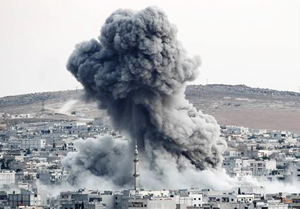Beirut, May 3: US-led strikes targeting the Islamic State group killed at least 52 civilians in northern Syria, a monitor said Saturday, but the Pentagon said it could not confirm the report.
The Syrian Observatory for Human Rights monitor also reported 10 civilian deaths in a rocket strike Saturday in the northern city of Aleppo and said 40 others suffered respiratory problems in a pre-dawn chemical attack further north in Idlib province.
Observatory director Rami Abdel Rahman told AFP that US-led coalition strikes early Friday on the village of Birmahle in Aleppo province killed 52 civilians.
He said “seven children” were among the dead but that the toll could rise as 13 people were still trapped under rubble.
Kurdish militiamen and Syrian rebel fighters were clashing with IS rebels in a town roughly two kilometers (1 mile) away from Birmahle at the time of the strikes.
“Not a single IS fighter” was killed in the strikes on Birmahle, said Abdel Rahman, adding that the village is inhabited by civilians only and that IS has no positions there.
US Central Command spokesman Col. Patrick Ryder told AFP there was “no information to corroborate allegations that coalition air strikes resulted in civilian casualties.”
“Regardless, we take all allegations seriously and will look into them further,” he added.
Air strikes by the international coalition have supported Kurdish militias fighting IS in Aleppo province, most notably in the flashpoint border town of Kobani, which is near Birmahle.
Backed by the strikes, Kurdish fighters drove militants out of Kobani in January.





Comments
Add new comment